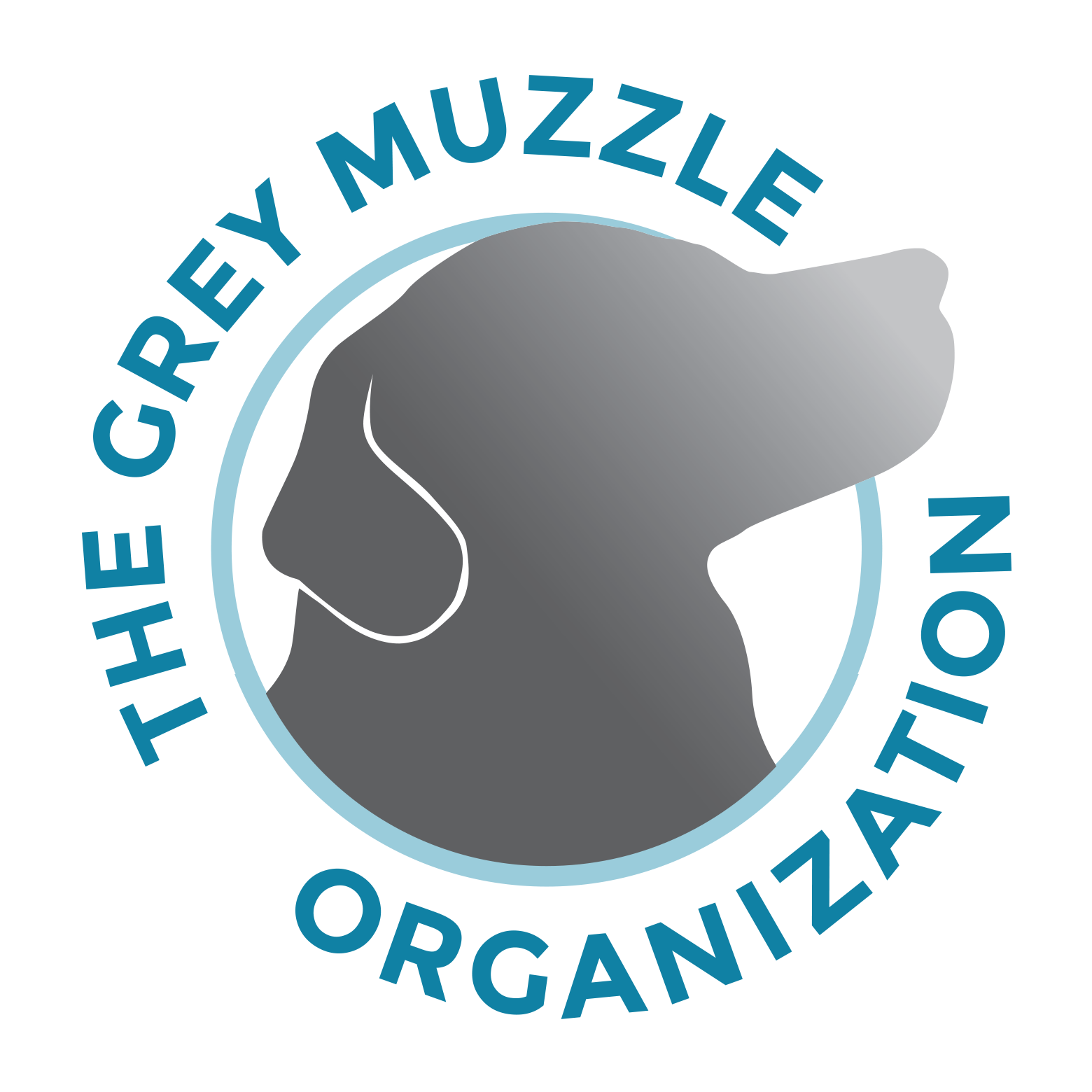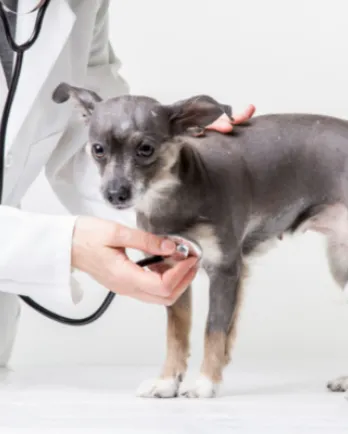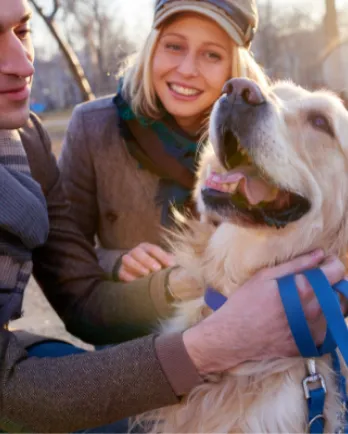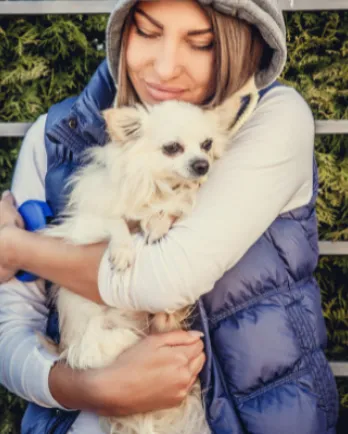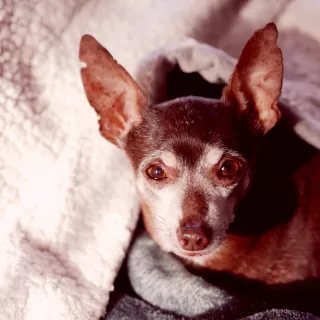How to Bond with Your Adopted Senior Dog
Editor's Note: This is a guest post on the Grey Matters Blog and not written by anyone affiliated with Grey Muzzle. We allow guest contributors from time to time in order to provide our supporters with a wide range of topics pertaining to senior dogs.
Bonding with any dog takes dedication, but as they age, building a strong bond can take a little extra time and work.
Senior dogs pull at our heartstrings. We take one look at their salt and peppered faces and our hearts melt! They are sweet, caring and inquisitive—just with a little less energy than they had in their prime.
Owners want to provide an active, healthy lifestyle for their dogs regardless of their age. However, with a senior pet, overexertion can sometimes happen. It can be difficult to discern when to draw the line on exercise, and you may need to visit the veterinarian more often than a yearly check-up
Life with a senior dog is different than one with a puppy, but that doesn’t mean our hearts aren’t just as full. Older dogs are every bit as capable of bonding and providing unconditional love as younger pups.
Read on for a few ways to bond with your dog that are suitable for senior dogs regardless of their energy level.
Ways to Bond
1. Be a Good Owner First
A healthy dog is a happy dog, and in order for your older pup to feel well enough to bond YOU need to stay on top of their health and preventative care.
Endless cuddles, snuggles, butt-scratches, and treats are a given, but having an established relationship with a veterinarian will ensure that if your pup is ever feeling under the weather, you can quickly get them any needed care.
Senior dogs have different physical, mental, and nutritional needs than younger dogs. Age itself is not a disease, but as your dog ages, their body will change and they have an increased risk of developing certain medical issues. A few age-related problems senior dogs may experience are renal issues, diabetes, arthritis, and cancer. Of course, all dogs are individuals and many senior dogs live long, healthy lives.
Your veterinarian has the diagnostic capability to determine what your senior pet needs to stay as healthy as possible while aging. The American Animal Hospital Association currently recommends that senior dogs have routine check-ups every 6 months, this is especially true for smaller teacup dog breeds.
Veterinary visits for senior dogs consist of a physical exam with the possibility of routine bloodwork, and urinalysis testing. These tests provide your veterinarian a comprehensive view of the inter-workings [Did you mean inner-workings?] of your dog’s body, and how to modify their diet, lifestyle and activity level, if needed.
By developing a quality relationship with a primary care veterinarian, you are being the best owner your dog could have and ensuring that he’ll receive any needed care.
Bonding is more than just spending time with your dog. It is learning exactly what their body and mind need and providing the opportunity for them to age gracefully and feel their best.
2. Routine is Key
Older dogs often function better with an established, daily routine!
Much like people, when dogs age, their senses aren’t as sharp as when they were pups. If your older dog is losing their hearing or eyesight, they may be more easily upset by unfamiliar changes and long periods of separation.
Rather than being frustrated if your senior dog develops separation anxiety, or seems more confused than normal, help them out instead. Use this as an opportunity to strengthen your bond with them. Establishing a routine for aging dogs can provide a sense of comfort and familiarity as they learn to adapt to their changing bodies.
Our pets depend on us for everything including comfort and safety. By maintaining a schedule for feeding, exercising and/or crating your dog, you are reinforcing that their needs will be met, even if they can no longer see or hear as well. A routine can help take the stress out of their lives because they will learn that they can count on you.
No person’s life is free from change, so work on setting up a routine that is as consistent as possible for both you and your dog. You will be amazed how much more comfortable your senior pup will seem!
3. Endless TLC
Tender loving care.
All dogs love attention, but senior dogs need a little extra. A dog that’s had a few more trips around the sun may want less laps around the block, and more sweet moments with you on the couch.
Many owners excel at this because loving on your dog comes so naturally. A few examples of showing TLC to your senior pup include:
- Car rides
- Short walks
- Snuggling
- Grooming
- Petting
- Praise
- Positive reinforcement
Many seniors enjoy low energy activities such as going for short walks or car rides, because it gets them out of the house without being too physically taxing. At the end of the day, or after an outing, many dogs just want to snuggle and take a good snooze!
Physical touch is another extremely important way owners can show their love and bond with their senior dog. Petting and grooming are great ways to help strengthen the bond you have with your senior dog. Regular brushing will help keep your pup’s coat clean, free from knots and smelling fresh. Brushing their teeth and caring for their oral health will not only help you bond, but will also reduce their risk of dental disease. And like dogs of any other age, senior dogs love to cuddle.
It is also important to continue to positively reinforce and praise your senior dog, even if they’ve already mastered their tricks and routines. Dogs thrive on pleasing their owners, and by continuing to positively reinforce desired behaviors your bond will be even stronger!
Wrapping Up
The bonding process with senior pups is truly no different than bonding with a younger dog, it just has a little less activity and a whole lot more cuddling.
Being a good owner to a senior dog includes establishing a quality relationship with a primary care veterinarian. The needs of an older dog are often drastically different from those of a puppy, and annual check-ups and testing are imperative to stay on top of potential age-related disease processes and changes.
Bonding also comes in the form of routines and TLC. Routines are very important for seniors because they have diminishing senses, making them more and more dependent on their owners. TLC is what all owners love to give their senior pups and it comes in many forms: walks, grooming, napping, or training.
Without a doubt, senior pups with their soulful eyes and grey muzzles fill our hearts more than we could ever imagine.
